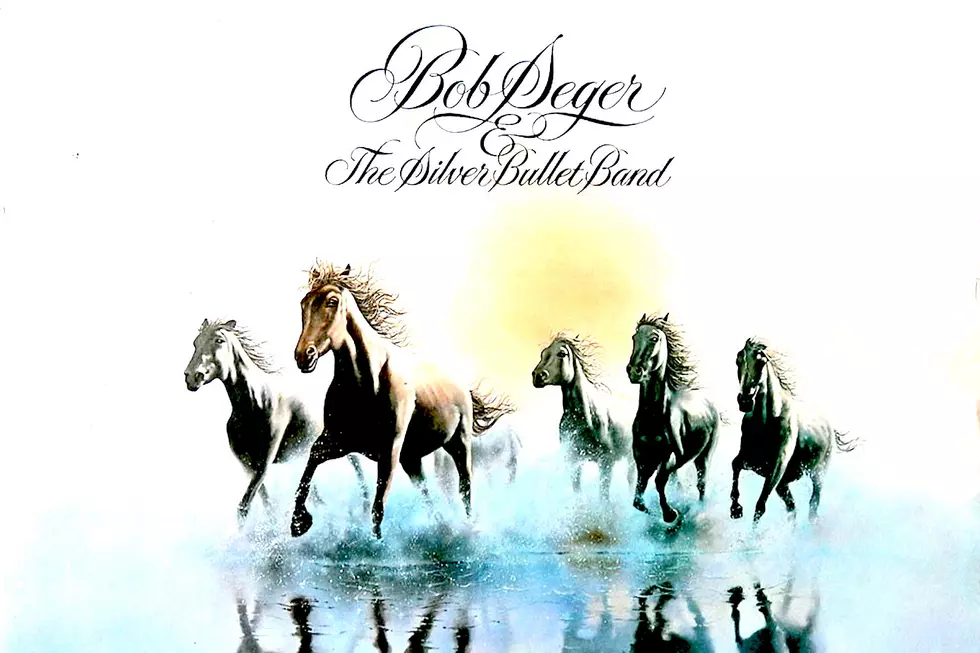
When Bob Seger Finally Scored a No. 1 LP With ‘Against the Wind’
Bob Seger achieved full-fledged rock stardom with 1976's Night Moves, but while his raspy howl may have been new to a generation of fans, he'd actually been chipping away at mainstream success for many years — and when he soared even higher on the charts with 1978's Stranger in Town, he still wanted more.
In fact, Seger admitted years later, he was gunning for nothing less than a chart-topping hit when he entered the studio to work on what would become his 11th studio LP, Against the Wind. "I was aiming for a totally commercial album," he told the Los Angeles Times in 1983. "Maybe it was a little too commercial, but I wanted to make sure I had three hit singles on it. I had never had a No. 1 album and I wanted one."
He knew how to get it, too. While neither Night Moves nor Stranger in Town were exactly hard rock records, Seger knew if he smoothed out his sound even further, he'd improve his odds of crossing over to pop radio, so he dialed back the rock quotient a bit with Against the Wind, crafting an album that shifted his sound just enough toward the middle of the road that it'd be irresistible for Top 40 programmers.
It sounds like a craven concession to commercial whims, but Seger was utterly deliberate about it, and applied the same level of hard work and songwriting craft to Wind's more radio-friendly cuts that he had to any of his rawer, rockier stuff; in fact, as he later admitted during an anniversary appearance on In the Studio With Redbeard, this period found him freer and looser than longtime listeners suspected.
"I was a very hard-working person, but I probably wasn't the best person to be around, unless you were really in my inner circle," mused Seger. "If you weren't within that circle, I was so busy working all the time that I was quite closed off. I think it wasn't until 1980 that I really opened up, and that's why I think I have such fond memories of Against the Wind. I think at that point I had relaxed, and you can almost hear it, there's less desperation – I don't know if that's a good or a bad thing – but Against the Wind is far more relaxed and offhand than Stranger in Town and Night Moves."
While he openly copped to altering his approach to record-making with Wind, Seger wasn't starting over. In fact, one of the songs that ended up making the cut — the first single, "Fire Lake" — got its start nearly 10 years earlier, and had been tabbed for inclusion on an album as far back as 1975's Beautiful Loser. While the final version ended up being rather different in the context of Seger's earlier stuff, it was squarely in step with the times; the song's loping, country-inflected arrangement ended up giving him a No. 6 pop hit. It proved an auspicious roll-out for a record that would ultimately live up to Seger's lofty sales goal.
Released on Feb. 25, 1980, Against the Wind knocked Pink Floyd's The Wall out of the top spot on Billboard's Top 200 Albums chart. "Fire Lake" was a sizable hit, but the title track gave theis album its biggest foothold on the Top 40, climbing all the way to No. 5.
Like "Fire Lake," the "Wind" single added a callback to Seger's past, reuniting him with Glenn Frey, a fellow Detroiter. Frey added background vocals to the title track from Seger's Ramblin' Gamblin' Man way back in 1969, then attained his own level of worldwide superstardom in the ensuing years as a member of the Eagles.
Listen to Bob Seger Perform 'Against the Wind'
Against the Wind had another Eagles tie in producer Bill Szymczyk, who helmed the sessions and was something of a coup for Seger — albeit one who was happy to preside over a relatively drama-free LP after being cooped up with the famously fractious band for the infamous The Long Run.
"That was a really fun album to do, especially coming off an Eagles album where everybody was at each other’s throats," nodded Szymczyk during a discussion with Classic Rock Revisited. "Bob is a sweet, Midwest guy. We are all from Michigan and we all understood that Michigan work ethic. Bob’s dad worked at Ford, so he grew up with a strong work ethic."
All that work paid off in spades for Seger and the Silver Bullet Band — and Against the Wind didn't stop with "Fire Lake" and the title track. The ballad "You'll Accomp'ny Me" hit No. 14, while the tongue-in-cheek "The Horizontal Bop" rounded out the album's singles, peaking at No. 42. True to his goal, Seger had put out a No. 1 album with three hits. The following year, he crowned his achievement with a pair of Grammys: Against the Wind walked away with the awards for Best Recording Package and Best Rock Performance by a Duo or Group With Vocal.
Against the Wind wasn't without its detractors. Some critics accused Seger of softening his sound to maintain his grip on fame after finally breaking through, while others nitpicked the LP's lyrical content in order to find fault. The record's third track, "Her Strut," came under particular fire from listeners who thought the song objectified women, although Seger later laughingly pointed out that he had the opposite intention.
While admitting that the chorus was "almost an automatic sexist thing," Seger told Redbeard that "Her Strut" was written about Jane Fonda, inspired by her appearance before the Campaign for Economic Democracies. "I was quite proud of her for doing that. I admired her crust," said Seger. "For going in there and having the strength to speak her mind, so I kind of wrote 'Her Strut' for an '80s woman ... you know, it was the dawn of the '80s, and I wanted to write a song about how women have become so confident and stepped out so much, and I thought Jane was a great role model."
Seger would ride out the '80s as one of rock's biggest stars, but Against the Wind marked the beginning of the end for him in terms of regular recording activity. While he'd return with a follow-up, The Distance, in 1982, it would be another four years before he finished that album's successor, Like a Rock — and another five before he reappeared in 1991 with The Fire Inside. In the years since, he's maintained a healthy if sporadic touring and recording schedule, and Against the Wind remains his only No. 1 album, as well as one he continues to look back on with tremendous affection.
"I think of all the albums I've ever done, Against the Wind is probably the easiest for me to listen to," Seger told Redbeard. "It's probably the most fulfilled I ever was as a songwriter. Things were going along real good, I was very relaxed, the tracks were very spontaneous, and the people I was working with, it was very exciting to be working with them." Years later, he said, "I really look back very fondly on that album."
Albums That Saved a Band's Career
More From WRKI and WINE










